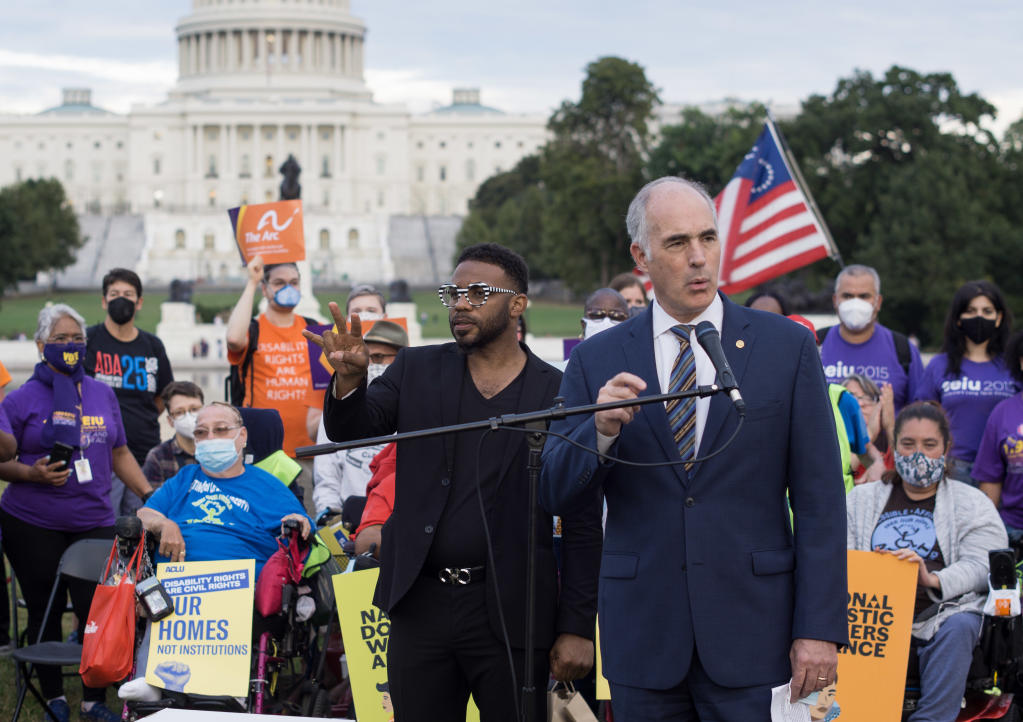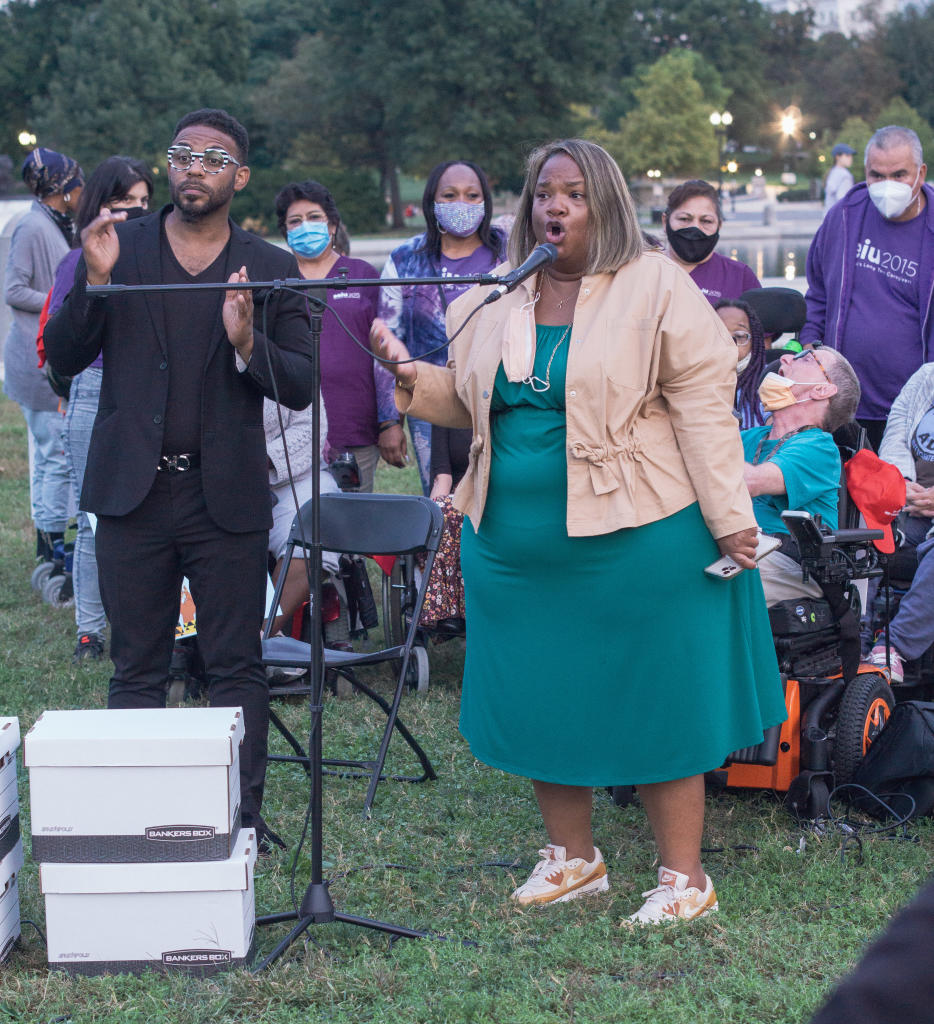
In their own words: Why recipients and providers of home care say Congress must act
“My name is Christopher Jorwic. I am 32 and I live in Elmhurst, Illinois, and I have autism…First, allow me to say that I am lucky to have Medicaid HCBS in a state that has a 20,000-person waiting list. Nobody should be without the support they need. To me, these supports are my lifeboat. It pays for workers to get me out of my house and therapies to get me out of my head. I go with staff to volunteer, to be out in the community, and some staff to help me with my communication. Obviously, I do not use my voice to speak. But staff help to make sure I can express my needs and wants.
“I worry about those who do not have people in their life who understand that every behavior is a form of communication. Where do they go? I have been through very dark times when I almost gave up, but the services I need were there so I can make progress, communicate, and be the independent man, uncle, and advocate that I want to be. Medicaid HCBS matters because it is a lifeline to people like me. We must make sure it is available to anybody who needs it, and we must support the workers who make it all possible.”
Christopher’s story – read aloud by his sister, Nicole Jorwic, Senior Executive Officer of State Advocacy and Public Policy for the Arc of America – was one of about 2,500 stories shared last week during a 24-hour vigil on the grounds of the U.S. Capitol. Advocates organized the vigil to push for historic, once-in a-generation federal funding for home and community-based services (HCBS). President Biden initially proposed an infusion of $400 billion to provide home care for more Americans, including older Americans and people with disabilities, and to substantially increase the pay for workers who provide attendant services.
A House version of Biden’s Build Back Better plan whittled the $400 billion request down to $190 billion. Advocates gathered to demand that those funds be included in the final version of the legislation – with some demanding that the full $400 billion be restored.
“We have been out here for almost 24 hours, hoping that Congress will listen, and act on advancing home and community-based services for a better deal for people with disabilities, our families, and workers,” said Maria Town, President and CEO of the American Association of People with Disabilities.

Sen. Bob Casey (D-PA), a staunch advocate of Home and Community-Based Services, speaks at “Care Can’t Wait,” a 24-hour vigil. (Photo by Nicolai Haddal.)
Among those who spoke at the vigil was Sen. Bob Casey (D-PA), a leading advocate for HCBS in Congress. He shared the story of “K,” a constituent in Pennsylvania:
“Home and community-based services matters because it’s allowed my brother to experience a life people with disabilities usually don’t get to have. My brother is able to live with me and I’ve been able to be his caregiver because of his PFDS waiver allowing him to have as full a life as possible. People with disabilities are people too! I shouldn’t have to say that. But the way people dehumanize people who have a disability and their caregivers is even more a reason why HCBS supports and waivers should be expanded, equitably available, and equitably funded so that my brother can have the life he desires despite his disability and so I can too, despite my caregiving responsibility.”
Many advocates who shared stories described HCBS as the one thing that prevents some older Americans and people with disabilities from being forced into institutions. Natalie Kean, Senior Staff Attorney for Justice in Aging, shared the story of Crystal McGee, a 74-year-old Chicago woman with multiple disabilities. McGee is able to live on her own, despite the fact she has no family members nearby, because of HCBS. Her story:
“Having a home caregiver has made it possible for me to live independently and not have to live in a nursing home, assisted living facility or with family. She takes care of my life-sustaining duties, including weekly cleaning, laundry, and taking me grocery shopping. She gets my mail and any packages delivered to the main lobby area. She accompanies me to my doctors’ appointments and picks up my prescriptions…I had cataract surgery twice earlier this year and she accompanied me both times. My caregiver stayed in direct contact with my immediate family members from the time we reached the hospital to getting me home and settled in bed. This allowed me to focus on healing and not on logistics or phone calls all day. This also put my family at ease, knowing that I was not alone, that I was well-taken care of, while keeping them abreast of what was going on…I want to stay at home, living on my own, and my caregiver is the primary reason this is possible.”
But it is not just older Americans who, with the help of Medicaid-supported HCBS, are able to achieve a level of independence and avoid costly, isolated institutionalization. Elena Hung is the Co-Founder and Executive Director of Little Lobbyists, a group formed to advocate on behalf of children with complex medical needs and disabilities. This is her and her daughter’s story:
“Seven years ago, I had a great pregnancy and amazing birth and then 15 minutes after my baby was born, she was rushed to the neo-natal intensive care unit, where she remained for the next five months. She was diagnosed with serious medical conditions affecting her airways, her lungs, her heart, and her kidneys. She needs a tracheostomy to breathe, a ventilator for additional respiratory support, a feeding tube for all of her nutrition, and a wheelchair to be able to explore the world around her…The medical care she received helped her survive and the HCBS she received helped her thrive. Now, I am not going to tell you it was easy. Xiomara is not sick enough to be in the hospital, but she is sick enough to require an awake and alert skilled caregiver – someone around-the-clock to help her, someone who is trained in tracheostomy care and knew what to do in case of an emergency, and in this case an emergency means life or death in a matter of minutes.
“Medicaid paid for the home care so that she would not have to be institutionalized far, far from home…You know, I have often said there is not one thing I would change about my daughter. But there are a million things I would change about this world, so that it would be worthy of her. And one of those things I would change would be to fully fund HCBS so that disabled kids like her can have a chance at a childhood, can grow up at home with a family that loves them, and be part of a community that is accessible and inclusive.”
Many speakers at last week’s vigil expressed anger toward elected officials who do not seem to understand the reality of their lives. Josue Rodriguez is a Latinx organizer with ADAPT in El Paso, Texas. He uses HCBS for attendant services:
“I can’t seem to comprehend how difficult it is for legislators to understand how important attendant services are to us. My attendant allows me to live a more independent life and to be active in the community. However, it seems that those leaders we elect to represent us would rather have us locked up in nursing homes and other institutions – something we very well know is more expensive.”
And Jennifer, an attendant working in Austin, Texas who did not give her last name, said some elected officials have created a false choice between human and physical infrastructure:
“I have to say I have found it so frustrating that the country is being told we have to choose between hard infrastructure, which is roads, bridges and sidewalks, and human infrastructure. The debate that…Senator Manchin and Senator Sinema have fostered is a false choice between roads, bridges, sidewalks, and people. That’s ridiculous. Why?”

April Verrett, President of SEIU Local 2015 in California, demands better funding for Home and Community-Based Services and more pay for caregivers. (Photo by Nicolai Haddal.)
The vigil was co-hosted by ACLU, ADAPT, the Arc of the United States, Autistic Self Advocacy Network, American Association of People with Disabilities, Bazelon Center for Mental Health Law, Be A Hero, Care Can’t Wait Coalition, Caring Across Generations, Little Lobbyists, Justice in Aging, National Council on Independent Living, National Domestic Workers Alliance, National Council on Aging, National Health Law Program, and SEIU.
All of those gathered seemed to agree with the sentiments of April Verrett, President of SEIU, Local 2015 in California, which represents hundreds of thousands of home care workers. “Pass the reconciliation bill,” Verrett said. “Fully fund HCBS services so that we can expand access to care for millions of seniors and people experiencing disabilities across the country. And we can do that and at the same time take care of the workers who administer the care. Pass the bill. Do it now.”

